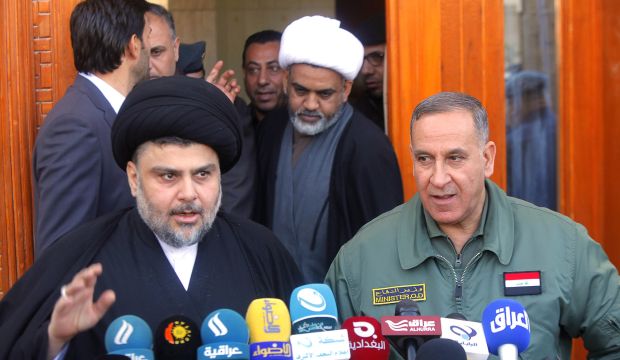
Iraqi Shi’ite cleric Moqtada Al-Sadr (L) speaks next to Iraq’s Defense Minister Khaled Al-Obeidi (R) during a news conference in Najaf, south of Baghdad, on January 19, 2015. (REUTERS/Alaa Al-Marjani)
Baghdad, Asharq Al-Awsat—Sectarian militias and other armed groups are a danger to the “unity and prestige” of the Iraqi army, the head of the Shi’ite Sadrist Movement, Moqtada Al-Sadr, said on Sunday.
Speaking at a joint press conference with Iraq’s Minister of Defense Khaled Al-Obaidi at his home in Najaf, Sadr said: “The army remains strong and we will work together in order to return its prestige and unity—as well as that of Iraq as a whole—until it is once again able to be in control of the situation in the country.”
Sadr—whose movement also has its own military wing originally known as the Mahdi Army—maintained that in order to achieve this it would be necessary to “eject all militias and other groups” in order to form “a single, unified national force to take their place.”
As well as calling for curbs on militia forces, the Shi’ite cleric announced that he was placing his followers at the disposal of the Iraqi military.
“The Iraqi army is the only body that should regain control of things on the ground from the terrorists and takfirists and any other danger which faces Iraq,” he said.
Sadr said the Iraqi army was “not a sectarian army but an army for the whole country that must defend every part of this nation,” adding that his comments were a “message for all Iraqis, as well as foreign countries.”
Efforts by the US and its allies are currently underway to reform and retrain Iraq’s armed forces, after army units stationed in and around the city of Mosul collapsed in spectacular fashion last year in the face of a lightning advance by fighters from the Islamic State of Iraq and Syria (ISIS).
As well as Kurdish Peshmerga forces, Baghdad has since called on armed Sunni tribal groups and Shi’ite militias to help it fight ISIS and take back territory lost to the militants. Despite reports of militia units engaging in campaigns of sectarian violence akin to that which plagued Iraq in the wake of the US-led invasion of 2003, the initiative has led to some successes on the battlefield.
Responding to Sadr’s comments, Hamid Al-Mutlaq, the head of the Security and Defense Committee in the Iraqi parliament, told Asharq Al-Awsat that Sadr’s position on militia groups and the future of the Iraqi armed forces was “a positive vision” and one that was necessary to build on.
“The army’s mission is to defend the country’s borders against any outside attack, whereas the raison d’être of these armed groups and militias is simply to destabilize the military and take it away from its original mission which only it can fulfil,” he said.
He added that if the army were “united and no longer associated with other groups,” this would reflect on the country as a whole and help foster unity within Iraq, as well as strengthen its current fragile security environment.
Events in Mosul last year revealed the extent to which the army was in need of further support, arms and training, and the necessity for all Iraq’s politicians to work together to bring back the country’s army to its former state, and to establish a “unified ethos and esprit de corps” within the institution, Mutlaq said.
He added that it was the “dictatorial decision” by Paul Bremer, the former head of the Coalition Provisional Authority set up in the wake of the US-led invasion, to disband the Iraqi army in 2003 that had been the main cause of its deterioration since then.
